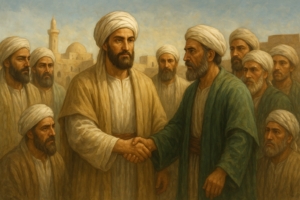Muslim Collectivism: The Unfinished Promise of the Ummah
Muslim collectivism is not a modern invention born of political necessity — it is an ancient, faith-rooted idea that has shaped the course of Islamic civilisation for more than fourteen centuries. At its core lies the Qur’anic command to “hold firmly to the rope of Allah all together and do not become divided” (3:103). In the Prophetic tradition, the Muslim community is likened to a single body: when one part aches, the whole feels the pain. This is not just religious poetry; it is a call to structure society around mutual responsibility, shared identity, and a collective moral purpose.
Historically, the Ummah flourished when this collectivist ethos translated into political unity, equitable economic systems, and cultural dynamism. The early Islamic state in Madinah was founded on brotherhood between the Muhajirun and Ansar, showing that solidarity could bridge ethnic, tribal, and economic divides. Later, under the Rashidun and early Abbasids, Muslim unity facilitated not only territorial expansion but also a golden age of scholarship, science, and trade.
But history also records the slow erosion of this ideal. Internal power struggles, colonial interventions, and imported ideologies fragmented Muslim political authority. The 20th century saw the Ummah reduced to nation-states with competing interests, often pitted against each other by global powers. The fragmentation deepened with sectarian divisions — Sunni versus Shia — which, while rooted in early Islamic disputes, were inflamed by modern geopolitics and foreign intervention.
Today, the gap between the ideal of Muslim collectivism and its reality is stark. The Muslim world spans over 50 countries, rich in resources and youth, yet it often fails to present a unified voice on issues like Palestine, Kashmir, or global Islamophobia. Where unity does emerge — as in humanitarian aid networks, Islamic finance, or coordinated diplomacy in bodies like the OIC — it remains the exception rather than the norm. Still, moments of solidarity, whether in disaster relief or shared political stances, show that the instinct for collectivism is alive, waiting for leadership and vision to channel it.

Overview
Muslim collectivism is both a spiritual and socio-political principle that emphasises unity, shared responsibility, and mutual welfare. It has deep historical roots and has been central to Muslim identity and power. While modern politics and sectarianism have weakened it, its revival remains essential for the Muslim world’s dignity, security, and influence.
Notes
-
Qur’anic and Prophetic teachings urge unity and forbid division.
-
Early Islamic history shows collectivism enabling political stability and cultural growth.
-
Colonialism and modern geopolitics fractured Muslim unity into nation-states.
-
Sectarianism remains a major obstacle to solidarity.
-
Revival of collectivism requires leadership, education, and economic cooperation.
Relevant CSS Syllabus / Subjects
-
Islamic Studies: Concept of Ummah, Islamic political thought.
-
International Relations: Muslim bloc politics, OIC diplomacy.
-
Current Affairs: Muslim world’s stance on global issues.
-
Essay Paper: Unity in diversity, revival of collective identity.
-
Pakistan Affairs: Pakistan’s role in Muslim solidarity.
For Beginners
Muslim collectivism means Muslims everywhere are like one big family — caring for each other, helping in need, and standing together when one is under attack. This idea worked really well in the early days of Islam when unity brought strength and respect. Over time, politics and outside influence split the family apart into separate countries and even rival groups. But whenever Muslims work together — for example, to help in disasters or defend a shared cause — they show that unity is still possible.
Facts & Figures
-
Muslim population: Over 1.9 billion (about 24% of the world’s population).
-
57 member states in the Organisation of Islamic Cooperation (OIC).
-
The Islamic Golden Age (8th–13th centuries) thrived under strong collective governance.
-
Muslim-majority countries control over 60% of the world’s proven oil reserves.

